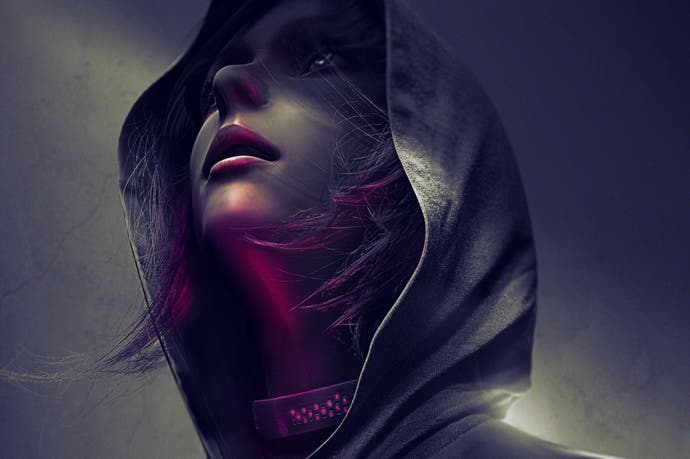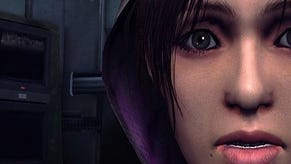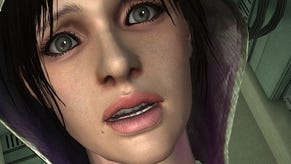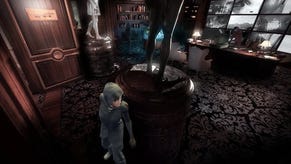Ryan Payton's Republique
From Metal Gear Solid to Halo to the App Store.
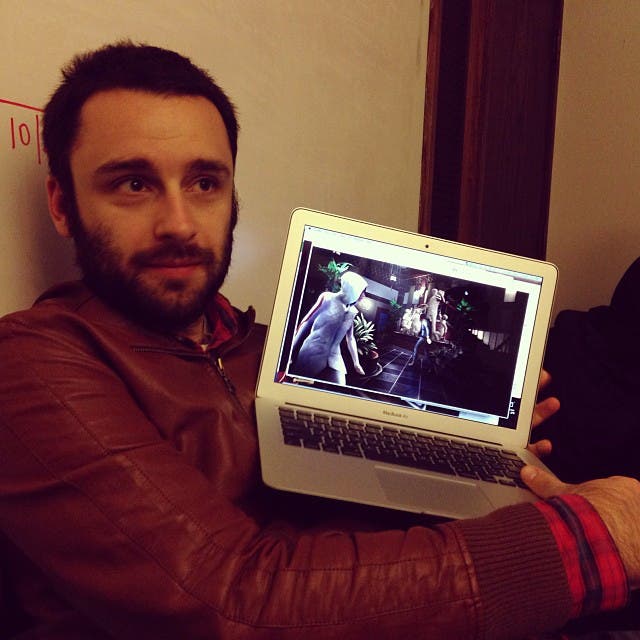
Last night Ryan Payton worked late. He and his team at independent developer Camouflaj were trying to work out how to get Republique, the £2.99 iOS stealth game, into the hands of the thousands who backed its successful (just!) Kickstarter. Payton discovered, as others have before him, that there's no easy way to do this. Eventually it dawned on him: the only solution is to manually send out codes. To thousands of expectant players. Some at Camouflaj cursed the Republique Kickstarter. "I don't know where we'd be without the Kickstarter, seriously," Payton countered.
Eventually, at 3am, Payton went to bed. Now, just three hours later, at half past two in the afternoon in the UK and half past six in Seattle, Payton is up, talking to me over Skype as Republique is emerging from the shadows to launch on the App Store. He tells me he's late, in fact. Normally he rises around 5am. He slept through his alarm, but he doesn't sound tired at all. He sounds excited.
And so he should. Payton's journey to this point has been long and, at times, troubled, While living in Japan and working for Kojima Productions, Payton was western gamers' link to the development of the impossibly-hyped PlayStation 3 exclusive Metal Gear Solid 4. All this responsibility for someone only in their twenties. And then, in 2008, he left, saying he'd achieved all he wanted to, for rainy Seattle, Microsoft and the enticing prospect of leading design on the story of the first non-Bungie-made Halo shooter.
Three years later Payton shocked many when he announced he had left 343 Industries. At the time it seemed all was not well. Payton's brief comments on the matter suggested he wasn't happy, that the Halo he wanted to make simply wasn't going to happen. Around this time it emerged he had suffered from depression. He went dark, licking his wounds, plotting his next move.
Now, two-and-a-half years later, we're seeing the result of that move: Republique, which today launches on the App Store. Here, in an interview with Eurogamer, Payton discusses his time working on Metal Gear Solid 4, his exit from Microsoft and how Camouflaj - and Republique - were born.
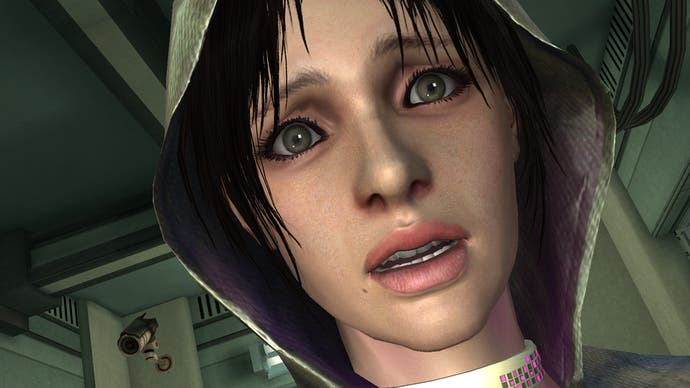
You've had a number of ups and downs during the development of Republique. Now the game is launching, can you see the light at the end of the tunnel?
Ryan Payton: In some ways, but in some ways we're just getting started. This hasn't been a secret - and we've been talking about it publicly for about six months - but we've been working on the game and talking to our backers about it being episodic, but for most people that's news. What that means is we're shipping episode one but we've got a lot of work to do because we've got to finish episode two and then we've got to move onto episode three. We've got a lot of work ahead of us, plus PC and Mac.
How do you feel about the quality of the game you're putting out?
Ryan Payton: I feel really really good about the baseline game we're shipping. Not only from a design perspective, but just as a fan of what we're doing and of our writer Brendan Murphy. I'm genuinely excited about the future episodes. We're introducing new mechanics into future episodes, but the base of the game is there. And the scariest thing about this whole entire project is going home at night literally hundreds of times, thinking, I don't know if this thing is actually going to work. And there I'm referring to the core gameplay loop.
I'm not exaggerating: three to four weeks ago it actually wasn't working very well, and it wasn't good. Now we've figured out the camera system and the one-touch gameplay, I'm just so excited to be able to just work on content moving forward.
If it wasn't working three or four weeks ago, you were cutting it close for release on 19th December, weren't you?
Ryan Payton: We're definitely cutting it close, but that said, if the core gameplay loop just wasn't working at the beginning of this month, I don't think we would be releasing on 19th December. I would figure out some sort of way to delay it further.
I've seen some who hadn't backed the Kickstarter express concern about the cost of the game. Episode one is five dollars (£2.99) and then on top of that there's a $15 season pass.
Ryan Payton: We're following the Telltale model almost to a tee. The base game is $4.99 and the season pass is $14.99. But we don't expect a lot of players to buy the season pass early on. With Telltale games they give you a 25 per cent discount if you buy them in bulk. That's one of the reasons we've further incentivised the season pass, unlike other games.
One of the cool things about our season pass is it unlocks this intense dev commentary into the game. It includes 20 dev commentary tapes you can find throughout the world. They're two to three minute recordings of our design meetings. And they're happening in real time. I just recorded all of them, and edited them down to two to three minutes. We put them in each room of the game along with a bunch of work-in-progress images. So players who are really interested in game development can just scan those things and understand, 'oh, I see, they were trying to move the bush here or they were trying to move the locker here.'
We also give players an in-app making-of video, and we also give them early access to episode two. So yeah, we're trying to incentivise the season pass, but we understand it's probably not going to be a hot item. Most people are just going to buy the $4.99 app.
What are people getting from the first episode for their five dollars, then?
Ryan Payton: It's a very low price for the amount of content we're offering. And it's the highest price we could have set the game.
We've been lucky that in December in particular on the App Store there's been something of a resurgence in the premium pricing model, with Assassin's Creed: Pirates coming out at $4.99, Skulls of the Shogun, The Room 2, GTA: San Andreas - there have been a number of really good $4.99 apps coming out.
Our fastest playtester was about two-and-a-half hours, and then our longest playtester was about six hours. So it's about a three to three-and-a-half hour average. There's a tonne of collectibles. In order to get 100 per cent and all the achievements, it's pretty intense. There's a lot of volume in the app. We feel really happy about it and there's a tonne of value add for a small five dollar app on the App Store.
"I remember in 1998 I was in high school and playing Metal Gear Solid in my parents' basement, and being completely enthralled by it."
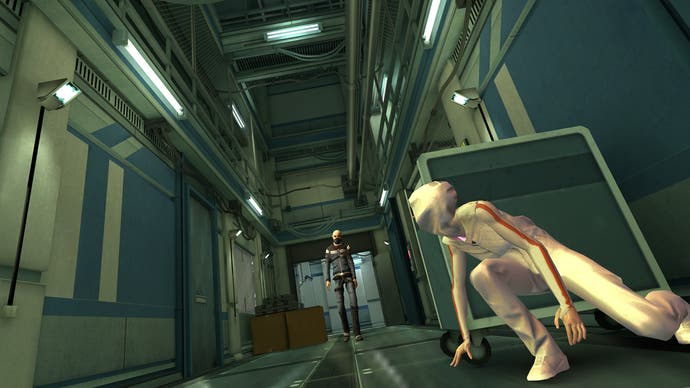
Clearly, you're a fan of stealth, which comes as no surprise given your work on Metal Gear Solid. But when did that love affair with stealth begin, and how did your experience working on MGS4 influence your ideas about the kind of game you wanted to make?
Ryan Payton: I remember in 1998 I was in high school and playing Metal Gear Solid in my parents' basement, and being completely enthralled by it. I was inspired by a number of things in the game. One was the voiceovers and what they added to the experience. The second was there was a message. There was an actual political undertone to the experience I thought was fascinating and very different. And thirdly, I was encouraged by rewards and mechanics based on a non-lethal playthrough. That got me thinking about what games could really be. That's always stuck with me.
Fast forward eight years later and I'm working on the sequel to the sequel to the sequel of that franchise. It was surreal. I took a lot away from that experience. The main thing was the team's commitment to quality. It wasn't so much the mechanics. I learnt a lot about game design and what works and what doesn't work in story. It was just, Kojima Productions staff are obsessed with creating the best thing they can. It didn't matter if it was a Tokyo Game Show pamphlet or if it was a trailer or a scene in the game, they set such a high bar for themselves. I left with that same mentality, and I've tried to instil that inside of Camouflaj now.
Did you get the idea for Republique from the Metal Gear Solid series?
Ryan Payton: When I started thinking about what Camouflaj's first game was going to be, funnily enough it was not a stealth game. It was a mental exercise I had done thinking about what we could do for narrative with mobile, seeing graphics and processors had got a lot better, and thinking about how we could be first and best with facial performance and try to have the fantasy of talking to somebody on the other side of your device.
It wasn't until we had pitched the prototype and proof of concept to a local publisher, where they came back and said, 'yeah this is really cool, but we want to see more traditional gameplay. Could you do that?', that I went back and starting thinking about things. We started to prototype the game through other cameras, not only your camera phone, but through surveillance cameras in the facility of the narrative we had. And Hope was already in the story. Instantly the game started to look like Resident Evil 1.
I got excited then because I'm the biggest fan of the 32-bit era, more than any era in the history of games. So the game started off as more of a survival horror. And then the last step was, because I wasn't interested in Hope shooting or knifing people, that's when we started to understand that, you know what? The game, whether we want it to be or not, is a stealth game, because we imagined that Hope was trying to escape, and she's trying to avoid conflict as opposed to inviting it.
"The way we developed games in Japan was so different. There are unique and cool points about the Japanese development style, but to be completely honest, when I got to the States everything started to make a lot more sense."
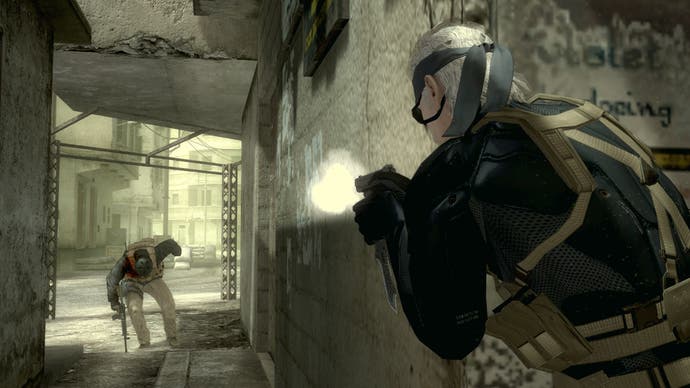
Going back a bit, after working on MGS4 you worked on Halo 4. Did your experience working on Halo inform your game design philosophy or anything that's gone into Republique?
Ryan Payton: That's such a big question. When I joined Microsoft in 2008 I remember feeling like I was a college hire. I remember feeling really unprepared for developing games in the States and outside of Japan. The way we developed games in Japan was so different. There are unique and cool points about the Japanese development style, but to be completely honest, when I got to the States everything started to make a lot more sense. It was a lot more efficient. But at the same time I didn't have any experience in the way they were building games. So the three years I had at Microsoft were very much an education for me.
I became a student of the school of Bungie design. We were tasked with creating a follow-up to one of the biggest video games of all time, and we didn't really have an instruction manual. I was in no better position than a kid who's got an Xbox in his basement who plays Halo every day. I had to learn by playing and observing and by reading forums and trying to understand what makes Halo special to people. I don't know if that contributed anything to the design of Republique, but it was definitely a unique experience.
I guess the area in which I grew the most was, one, in the my respect for purity of Bungie's design. That has always been something top of mind. The second thing is, because Microsoft is so manager driven, in other words, if you're high up in the company like I was, that means whether you want it or not you have to take on more and more management responsibilities. And so, as a 28-year-old kid, managing a lot of people who were sometimes 10 years older than me, I had to grow up fast when it came to management.
Thankfully I made a lot of mistakes and I've learnt from them. I'm trying to be much better about leading people at Camouflaj.
Had you always planned to go it alone and start your own studio and build this game, or was it the result of circumstance after you left 343?
Ryan Payton: I won't get into the details about my experience at Microsoft and why I left, but the truth is I probably wasn't the right creative director they needed at that time.
"We were tasked with creating a follow up to one of the biggest video games of all time, and we didn't really have an instruction manual. I was in no better position than a kid who's got an Xbox in his basement who plays Halo every day."
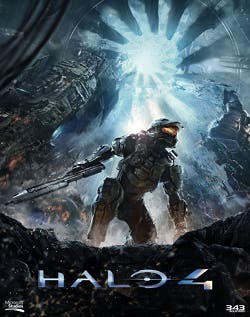
Why do you say that?
Ryan Payton: I was very young. I was pushing really hard for a game that I don't think was the right game for a new team. So when I realised that... they made some changes internally, and it wasn't very good for my career, I guess you could say - at the time at least, I thought. My third year there I started to really question if I had the right personality type for a big company. I even felt that when I was at Konami at times.
But for my admittedly short career in the video game space I never thought going it alone was an option, because that wasn't how the games I liked were made from 2005 to 2011. They were made at big companies by big teams with millions of dollars, and they were distributed through channels only the big players could use, like GameStop and Xbox Live with their slot system.
As I was trying to plot my next move, which I was thinking about, I did a lot of interviewing internally at Microsoft for different projects. But I also looked outside for options. I follow the game industry closely, obviously. I noticed there was this independent game revolution happening. There were a lot of things I noticed that started getting me thinking, wait a second, if I go independent, I don't have to make a two-person or three-person team to make a flash game. With Unity and with LinkedIn and the ability to work with people around the world remotely... and one of the bigger things with the App Store and Steam is you don't have to have a big publisher. You can self-publish and there's little red tape.
Everything started coming together. The missing piece of that pie was the financing side of it. Serendipitously, that came into place literally six months later when Kickstarter started to blow up.
I get the impression it's difficult for you to talk about your time at Microsoft.
Ryan Payton: Yeah, it is difficult for me to talk about my time at Microsoft, for two reasons. When I look inside myself, the fact I didn't ship the game as creative director, I look at that as a personal failure. But secondly, out of respect for that team, and because I want to look forward and not look at the past, I try to avoid talking about that experience. It wasn't all entirely my fault, but I want to be better about that and not point fingers and not focus on any negativity.
From the outside looking in, it seems strange that you would not want to work on Metal Gear Solid or Halo, these two coveted franchises that so many would kill to be a part of.
Ryan Payton: That's really interesting. If you ask my university self what he thinks, he's saying, 'whoa! What happened, man? You should have hung in there. What a privilege to work on Metal Gear and Halo.' And I would agree with him. But the IP can only take you so far in your personal happiness.
It's strange. I'm still a really big Metal Gear fan. I don't hold any sort of resentment. I don't lose sleep at night over leaving. One, it was of my own accord. Two, I felt it was the right time. Three, I did the best I possibly could in a very Japanese company, living in Japan. I'm so grateful for that entire experience.
But when it comes to Halo, maybe it's my own self-defence mechanism, but as much as an honour as it was to work on that franchise, because we had inherited it from Bungie, it never felt like it was truly ours. At least, it never felt like it was truly mine. That's totally natural. That's a smart approach to thinking about it.
"After that meeting my business partner Geoff and I walked over to a coffee shop and we sat down. We were depressed. I looked on my phone and I saw what was happening with Double Fine that day."
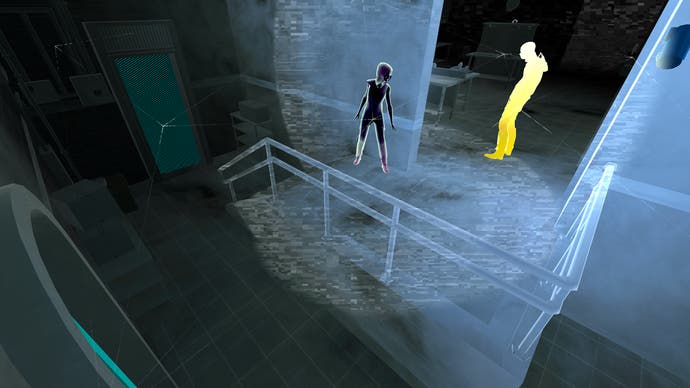
You mentioned you at first tried to get funding for Republique through a publisher. Why didn't that work out?
Ryan Payton: It's funny. I remember that day. We went to an industry veteran here in Seattle called Todd Hooper. He used to own his own start-up, and now he works at Unity. We told him what we wanted to do. We said, 'here's our game, we want to own the IP, we want to be in complete creative control, we want to self-publish the game, and we want to find an investor who's willing to fund us.' He said 'good luck' and he laughed.
He said, 'for all that stuff you want - and it's a very expensive game - nobody's just going to give you that money and not want a piece of that pie.' He was absolutely right, and it was naïve of me to think otherwise.
After that meeting my business partner Geoff and I walked over to a coffee shop and we sat down. We were depressed. I looked on my phone and I saw what was happening with Double Fine that day. It was the day they started to blow up on Kickstarter. It was crazy. I remember asking Geoff, 'do you think this is something we could try to do?' He said, 'I don't know.' So over the next few days we started to think more and more seriously about it. Then as time went on we realised, yeah, this is definitely the right move.
Your Kickstarter made $55,000 more than the $500,000 you were asking for. That to me sounds pretty close.
Ryan Payton: We cut it very close. I remember the Kickstarter campaign very vividly even though I've tried to forget parts of it. Really, for 29 out of the 30 days it was a complete failure. It was just a slog every single day to try to get above $500,000. What was surreal was in the last 48 hours we doubled our total.
How?
Ryan Payton: It's a combination of several things. As much as I wanted to give up, we never gave up. I think people saw a very public failure and part of it was sympathy and part of it was admiration for us not giving up.
The other thing was we announced the PC and Mac version after we listened to the community - even though I pitched the game as a solely iOS experience. But the biggest announcement for us was adding Jennifer Hale and David Hayter to the cast. That was big. It just started to snowball.
About a day before the campaign wrapped up, a friend of mine asked me what I thought the total would be. I said $555,555. To get super close to that was surreal.
"I didn't want to create this Frankenstein design of a game that could support both PC and touch. That would have been a bad move."
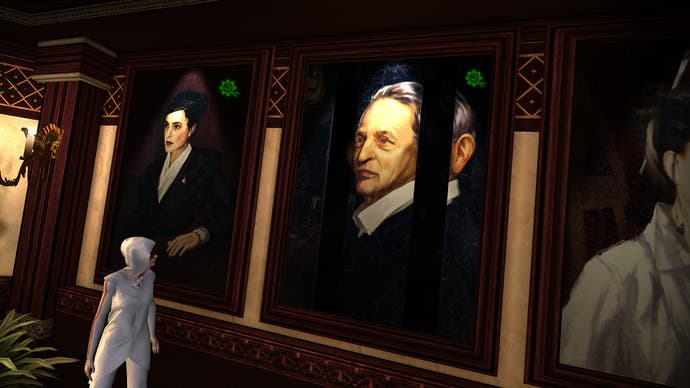
Looking to the future, what's the schedule for the release of the PC and Mac versions?
Ryan Payton: We don't have a release date set for the PC and Mac versions. Part of the reason is we needed the team to focus on iOS first. I didn't want to create this Frankenstein design of a game that could support both PC and touch. That would have been a bad move.
The PC backers have been patient with us and we appreciate it. Now episode one is out the door we can have a serious conversation with our backers asking them whether they'd prefer we just get episode one out the door for PC knowing there are going to be these incremental episodes, or do they want us to finish the iOS version before we put all of our effort behind the PC and Mac version. Ultimately it's going to be up to the backers because they're the ones who have got us this far.
Do you know when episode two will come out?
Ryan Payton: Some of it's going to be impacted by what the backers tell us, but the good news is the team is, as of weeks ago, already working on episode two. Especially the art team. Episode two is actually our vertical slice, so it's far along.
We're following the Telltale model of episodic so we're looking to release a new episode every two to three months. I want to take the proper time to finish episode two because it's an important episode for us. Episode one is strong in a lot of ways, but we had a lot of work to do to introduce threads in the game and in the story. Now with episode two we can actually just focus on Hope and the narrative as opposed to introducing a lot of core narrative elements.
